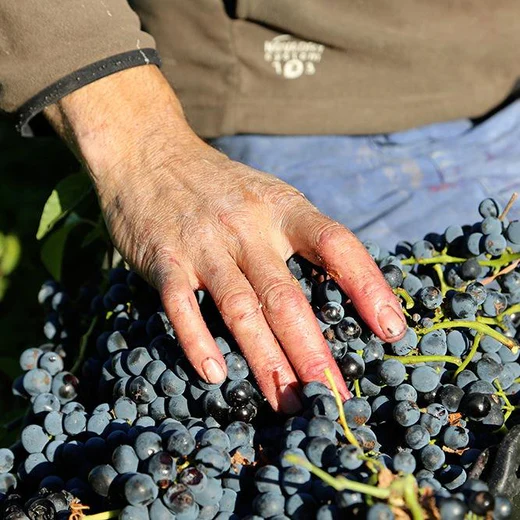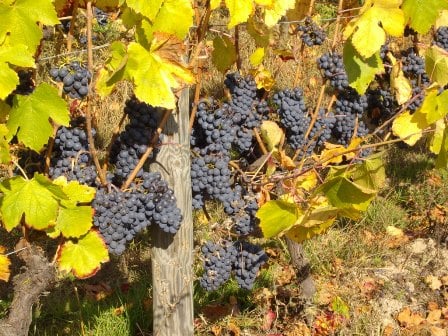
Wine without added sulphite
At Petites Caves, we offer you wines without added sulphite, the result of a commitment to preserve our terroir and the living character of wine. More natural and healthy for the human organism, wine without sulphite is made with respect for the authentic, for nature and for your health! The guarantee, for example, of a good evening with friends... without a headache the next day.

15,20 €
24,90 €
24,90 €
37,90 €
37,50 €
28,50 €
28,90 €
15,90 €
22,90 €
20,50 €
35,90 €
17,50 €
13,90 €
17,90 €
25,50 €
34,90 €
Find out more about our selection of "no sulphur" wines:
What is a sulphite-free wine?
Also known as "no added sulphur wine", it is a wine that does not receive the addition of sulphite throughout its production, from the vine to the bottle. However, a wine without added sulphite is not a wine without sulphite at all: the development of yeasts and the fermentation of the wine are accompanied by a natural formation of sulphur compounds, which will be found in the wine at very low levels. It is therefore very rare to have a wine with zero sulphite. This is why a winemaker will always indicate "contains sulphites", even for a wine without added sulphite.
Why can a natural wine be labelled "contains sulphites"?
Since 2005, European Union legislation has required that all wines with a sulphur content of more than 10 mg/l be labelled (or back labelled) as "containing sulphites". However, sulphite remains a natural component of wine in very small quantities and the winemaker of natural wine relies heavily on these natural sulphites to stabilise its wine and make it successful. Yeasts during fermentation can produce between 5 and 30 mg of sulphur. This explains why, even for a wine with no added sulphite, a wine maker will not take any risks and will add the mention to his label even if his wine has not received any added sulphur. But if the grapes are processed organically or biodynamically, they contain far fewer sulphur compounds: their natural sulphite content is much closer to 5mg/l than 30mg/l.
What is the use of natural sulphites in wine?
Sulphite, known as SO2, is a natural companion of wine. It plays 4 major roles:
● Preservative: it protects the wine from oxidation.
● Antiseptic and antifungal: it blocks the development of certain bacteria and yeast, as well as fungi and molds. It also controls alcoholic fermentation and disinfects wine barrels.
● Stabiliser: it promotes the expansion of yeasts favourable to alcoholic fermentation while blocking undesirable yeasts.
● Dissolver and clarifier: it enhances the decomposition of grapes and the release of tannins and aromas from the wine, as well as the formation of polyphenols, a natural antioxidant.
Is there an alternative to sulphites?
Making wine without added sulphite is therefore a global approach, even a philosophical choice, aimed at rediscovering the natural expression of the terroir. For a winemaker, it is possible to work without sulphur. From viticulture to vinification, this requires impeccable cleanliness. Each stage of the process must be extremely precise and controlled. The objective for winemaker is to avoid contact with oxygen and contaminating micro-organisms as much as possible, so that no additional SO2 is needed to stabilise the wine. This is a delicate task, as it is necessary to preserve the living character of the wine while avoiding any technical intervention that could alter the bacterial life. A wine without added sulphite means that winemaker has been able to control the alcoholic fermentation without adding any chemicals. All the wines of Petites caves are part of this quality approach.
Why choose a wine without added sulphite?
Have you ever had a headache after drinking a few glasses of wine? You should know that this is not due to the alcohol itself, but to the unnatural sulphites contained in your wine. Too much sulphur reacts badly with the human organism and causes discomfort such as nausea or headaches: sulphite has a vasodilator effect on the blood vessels, causing pressure in the brain and the resulting pain. In conventional winemaking, white wine tends to contain more sulphites than red wine. They are used to stabilise the colour of the wine and prevent it from turning brown, whereas red wines benefit from the antioxidant protection of naturally occurring polyphenols. The presence of biogenic amines (allergens) in wine, combined with the presence of large amounts of sulphites, can increase the risk of headaches. But rest assured: the maximum tolerated doses of SO2 are 30mg/l for red wines and 40mg/l for white wines.
It is therefore almost impossible to obtain a wine that is completely free of sulphur compounds. On the other hand, it is possible to greatly reduce the quantities ingested with natural wines without added sulphite. Their rigorous preparation allows the addition of SO2 to be limited while respecting the taste of the wine and your health.












































